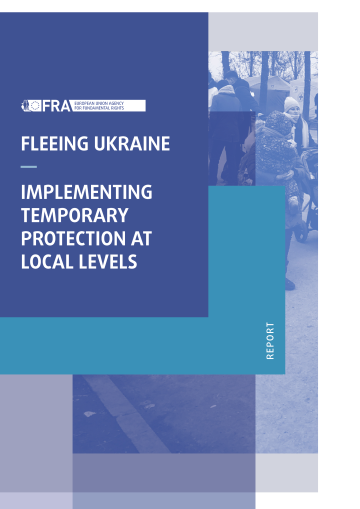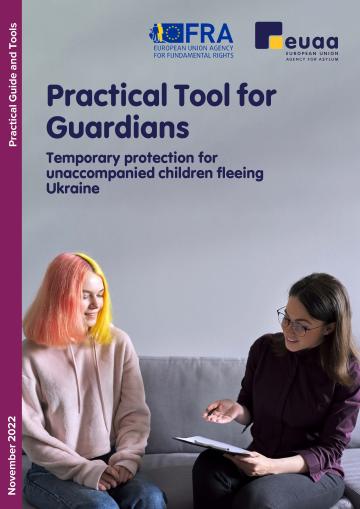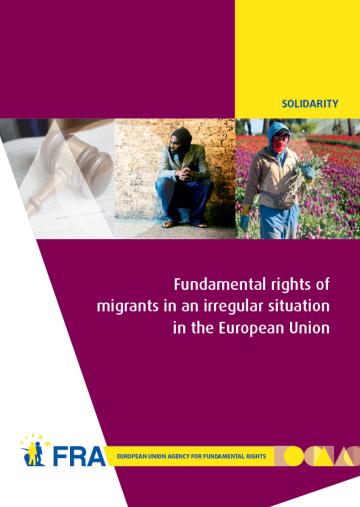All Member States covered have incorporated Article 12 of the TPD into national law (see ‘Legal corner’). They granted temporary protection beneficiaries access to employment, self-employment and vocational training, except Slovakia. It has not granted access to self-employment (see Annex 4).
For example, at the end of January 2023, in Czechia, 21 % of temporary protection beneficiaries (94,383 out of a total of 440,863) were in paid employment and almost 4 % (16,310) were registered as jobseekers. Three quarters of temporary protection beneficiaries from Ukraine who obtained work in Czechia from the outbreak of the conflict until the end of January 2023 were women. Of 4,870 temporary protection beneficiaries surveyed at the end of 2022, half (51 %) of those who had been working in Ukraine had a job in Czechia at the end of 2022. A quarter of those jobs were part-time. Of those employed, 15 % held long-distance jobs in Ukraine and worked online.
In Poland, out of 5,000 people displaced from Ukraine who approached the Warsaw labour office, about 3,900 registered there and 1,800 were employed as of 1 January 2023 [133] Poland, online interview with the Labour Office of Warsaw City Council, 4 January 2023.
.
In Estonia, as of 27 November 2022, 10,405 temporary protection beneficiaries out of a total of 14,647 temporary protection holders who had registered their residence in Tallin were employed, and 3,151 were registered as unemployed. Some 78.2 % of the unemployed temporary protection beneficiaries are women and 21.8 % are men [134] Estonia, response to information request, Unemployment Insurance Fund, 29 November 2022.
. As of 30 June 2023, 4627 temporary protection beneficiaries were registered as unemployed in Tallinn.
In Slovakia, more than 15,000 temporary protection beneficiaries from Ukraine out of a total of 96,030 were employed as of 14 January 2023 [135] Slovakia, Central Office of Labour, Social Affairs and Family, 26 January 2023.
. Approximately a quarter were employed in Bratislava region. In Nitra and in Bratislava region, the number of employed temporary protection beneficiaries is on the rise.
In some Member States, temporary contracts were prevalent. In Austria, temporary work contracts help many people enter the regular labour market [136] Austria, Public Employment Service, Styria, 23 December 2022.
. In contrast, in Slovakia, in November 2022 only approximately one fifth of the temporary protection beneficiaries were on temporary contracts. The rest had regular labour contracts.
In EU labour markets, displaced people mainly work in unskilled and semi-skilled jobs. For example, in Vienna, Austria, 3,952 employment permits were issued to displaced people between March and December 2022. The top three sectors they covered were hospitality, cleaning of buildings and hairdressing/beauty. Most of the temporary protection beneficiaries employed in Czechia at the end of January had blue-collar jobs in construction and production line work.
In France, in the Paris area, displaced men are more likely to be hired in construction, and women as cleaners or private nannies [137] France, interview with a representative of the association Equalis, Île-de-France, 27 January 2023.
. In Nice, displaced persons are hired mainly in the restaurant sector [138]
France, telephone interview with a representative of the French Association of Ukrainians of the Côte d’Azur, Alpes-Maritimes, 18 January 2023.
.
In Poland, there is some mismatch between the occupations in great demand on the labour market (construction, transport and logistics, packing, meat industry) and the skills and qualifications of the temporary protection beneficiaries. Ninety per cent of them are women and are not prepared to work in these sectors [139] Poland, online interview with Strategy and Entrepreneurship Office of Lublin municipal authority, 13 January 2023.
. Furthermore, women with younger children find it hard to take full-time jobs, even though childcare is available.
In Romania, according to the employment agencies representatives, most of the jobs that employers offer are for unskilled work in the assembling or garment industry, machine assembly, manual packing, kitchen work, waiting and handling goods. There is particular demand for housekeeping, childcare and cooking in Constanța, and education, childcare and nursing in Bucharest.
In Slovakia, in November 2022 the top sectors of employment for temporary protection beneficiaries were administrative services (26 %), industry production (25.8 %), wholesale and retail (7.7 %), and accommodation and catering services (7.2 %).
In Slovakia, in November 2022, 80.5 % of temporary protection beneficiaries had regular labour contracts, with the remaining having temporary job agreements.
People often mentioned overqualification as an issue. For example, in Belgium, national authorities are not always able to offer temporary protection beneficiaries jobs adapted to their qualifications, because they do not speak Dutch [140] Belgium, guide in diversity, Bruges, 2 February 2023.
.
Similarly, in Austria, most temporary protection beneficiaries have a high level of education (either secondary school or academic degree) [141] Austria, regional manager of the Styrian Public Employment Service, Graz, 23 December 2022.
. However, the demand for workers is predominantly in unskilled and semi-skilled jobs.
National authorities implemented various measures to support the employment of temporary protection beneficiaries. They included information provision, professional counselling and advice, labour mediation, professional training and support to recognise qualifications. Local employment agencies provided most of these measures.
Information on employment and training opportunities comes through online platforms and job portals. For example, in Ireland, the online JobsIreland recruitment service has developed a dedicated section to provide information in Ukrainian and Russian on employment supports and opportunities for those newly arrived from Ukraine. In Poland, each municipal authority in Warsaw, Katowice and Lublin has a dedicated web page on access to employment for people displaced from Ukraine. In Slovakia, the website of the COMIN centre, a contact point for all foreigners arriving and living in Nitra, and the website of the municipal office of Bratislava provides information on job offers and employment conditions in Nitra and Bratislava, respectively.
This information is sometimes translated into Russian or Ukrainian. For example, Austrian information booklets on the labour market were translated into Russian and Ukrainian. In Belgium, the information page ‘Actiris for Ukraine’ is also available in English and Ukrainian and provides general information for jobseekers.
Some Member States, for example Austria, Estonia, Poland, Romania and Slovakia, have government online job portals. In Romania, temporary protection beneficiaries seldom use them. They prefer other websites (such as ejobs.ro, bestjobs.ro, olx.ro, dopomoha.ro) or rely on Telegram, Facebook and Viber when searching for jobs, according to Internews and the Centre for Independent Journalism.
Many Member States have dedicated services at national or local level supporting temporary protection beneficiaries in searching for employment or training. Examples include AMS in Austria, Actiris (regional public employment office) in Brussels, Belgium, Eesti Töötukassa in Estonia and Assolavoro (the National Trade Association of Employment Agencies) in Italy.
In Brussels, Actiris has set up a specific desk to receive displaced people, with interpreters there. Actiris also recruited someone to inform people from Ukraine about available employment support measures in Brussels and to inform the authorities about the difficulties beneficiaries encounter [142] Belgium, information provided by the national authorities when reviewing this report in July 2023.
.In Ireland, the Department of Social Protection includes the public employment service. It has directly employed Ukrainian-speaking staff to help support jobseekers who have temporary protection [143] Ireland, information provided by the national authorities when reviewing this report in July 2023.
.
Employment fairs were mentioned as a way to connect employers and displaced people in Austria, Germany, Ireland, Poland and Romania. In Estonia, the Unemployment Insurance Fund organised recruitment days throughout Estonia for jobseekers who are beneficiaries of temporary protection and for organisations looking for employees. A total of 715 employers participated, and more than 18,000 jobseekers attended [144] Estonia, response to information request, Unemployment Insurance Fund, 9 January 2023.
.
Several localities organised information sessions or webinars on how to find work and/or establish oneself as self-employed. Informants in Styria, Austria, and Bruges, Belgium, mentioned that. In Germany, the Jobcenter and the Federal Employment Agency organised information events, job fairs and one-to-one counselling sessions focusing on general information on labour market integration for temporary protection beneficiaries with Russian/Ukrainian interpreters. In Berlin and Stuttgart, the local administration provided extra services, for example mobile and low-threshold job counselling, or mentoring programmes. Similar initiatives were also taken at the national level. For example, in Italy, Assolavoro, in collaboration with the United Nations High Commissioner for Refugees (UNHCR) and the World Employment Confederation, implemented the welcome&work project. That provides information on employment and free practical support services.
Many Member States’ employment agencies have dedicated information or referral services for temporary protection beneficiaries. Examples are AMS in Austria, Actiris in Belgium, Eesti Töötukassa in Estonia and Assolavoro in Italy.
Public employment services usually also provide individual assistance in the search for employment. In some Member States, specific programmes facilitate access to work and provide incentives for local employers to hire temporary protection beneficiaries from Ukraine.
For example, in Belgium, the PCSW offers a specific type of employment agreement whereby the authority acts as employer and the employee works for an external organisation that pays a part of the wage, with the PCSW paying the rest. The employee is entitled to unemployment benefits if the job does not work out.
In Czechia, a new project of the Labour Office, with finance from the European Social Fund, will train Labour Office staff to better tailor their support to migrant clients, including temporary protection status holders. It includes providing interpretation services.
In Poland, the ‘intervention work scheme’ is a form of subsidised employment based on a contract between the employer and the labour office. It had already been introduced before the arrival of people displaced from Ukraine and is available to all jobseekers registered with the labour office. It has proved particularly useful for employing Ukrainian-speaking teacher assistants and intercultural assistants.
On this scheme, the local district employs the person for 6–12 months. After that, the employer must employ the person for three or six months.
Still in Poland, the Warsaw labour office developed a special form of contract between the labour office, employers and the public health authorities to help train displaced Ukrainians in the restaurant sector. It allows the labour office to cover the expenses of the training [145] Poland, online interview with the Labour Office of Warsaw City Council, 4 January 2023.
.
In Estonia, in-job training is subsidised. Estonian employers can apply for financial support for job-related mentoring for employees who have international or temporary protection, and they can get reimbursed for the costs of obtaining the employee’s qualification, job-related translation services and job-related training.
Employment offices play a pivotal role in including temporary protection beneficiaries in the labour market. For example, the French employment centre Pôle emploi set up an outreach programme on its website. A questionnaire is available in French and Ukrainian by means of a QR code. The programme supports temporary protection beneficiaries in seeking employment, provides language courses and helps the beneficiaries to design their training and professional paths. Assistance is more effective in small cities and towns as it can be more individualised than in megacities like Paris or Nice, according to the experts interviewed [146]
France, phone interview with a representative of the association Mon coeur ukrainien, Île-de-France, 17 January 2023; telephone interview with a representative of the French Association of Ukrainians of the Côte d’Azur, Alpes-Maritimes, 18 January 2023; interview with a representative of the association Equalis, Île-de-France, 27 January 2023.
.
In Slovakia, the offices of labour, social affairs and families developed a specific project for displaced people. It includes subsidised education training or language courses; financial measures to support mentored training with an employer; volunteering activity, for which temporary protection beneficiaries receive some compensation; and a financial contribution for temporary protection beneficiaries moving for work.
The first measure taken to improve access to employment is language training (see consultation finding box). Many localities across the Member States introduced language courses for temporary protection beneficiaries. Usually local public employment services or institutions cooperating with them offered them (Belgium, Czechia, France, Italy, Poland, Romania and Slovakia). In other countries, other institutions were involved. In Dublin, Ireland, the City of Dublin Education and Training Board provides language courses and so do several private, community and voluntary sector organisations.
In Austria, the Austrian Integration Fund offers language courses in several localities. Similarly, in Germany, Ukrainian temporary protection status holders with a residence permit or provisional registration certificate (‘fiction certificate’) for temporary protection are entitled to access integration and occupational language courses [147] Germany, Ordinance on the Occupational German Language Promotion (Verordnung über die berufsbezogene Deutschsprachförderung, DeuFöV), § 44.
. The responsible authorities usually submit their applications for language and integration courses. In Estonia, free language courses are offered to people registered with the Unemployment Insurance Fund.
In Czechia, the Labour Office offers a wide range of language courses to temporary protection beneficiaries. Since the beginning of the armed conflict, 2,838 temporary protection status holders have attended a language course set up by the Labour Office (out of 440,863 temporary protection status holders from Ukraine present in Czechia at the end of January 2023).
In some Member States, certain requirements might have to be met. For example, in Estonia, free language classes are available through the Unemployment Insurance Fund once the person has been granted temporary protection and is registered as unemployed.
Some countries provide dedicated professional language courses. Poland, for example, provides language courses tailored to jobs in the gastronomy and hospitality sector [148] Poland, online interview with the Labour Office of Warsaw City Council, 4 January 2023; online interview with Katowice Labour Office, 26 January 2023; online interview with Strategy and Entrepreneurship Office of Lublin municipal authority, 13 January 2023.
.
Obstacles to language acquisition were reported in several Member States. In Estonia, only temporary protection status holders registered as unemployed can access language classes. In Germany, at least a fiction certificate (a temporary document issued until the temporary protection beneficiary receives the residence permit) is required to enrol in language classes. In Dublin, there are long waiting lists for English courses that the City of Dublin Education and Training Board provides. In Slovakia, more language courses are needed, including at advanced level [149] Slovakia, interview with a representative of Mareena, Bratislava, 27 January 2023.
.
3.3.4 Facilitating access to the labour market for healthcare professionals
The European Commission issued a recommendation on the recognition of academic and professional qualifications for people fleeing Russia’s invasion of Ukraine. It provides Member States’ authorities with guidance and practical advice to ensure a quick, fair and flexible recognition process.
In Estonia, the Unemployment Insurance Fund has been cooperating with relevant ministries to find a way of recognising the qualifications of Ukrainian care workers and medical staff. With the support of the Estonian Academic Recognition Information Centre, the Unemployment Insurance Fund staff have been instructed how temporary protection beneficiaries can have their qualifications recognised [150] Estonia, response to information request, Unemployment Insurance Fund, 9 January 2023.
.
Italy passed legislation in 2022 to allow temporary protection beneficiaries with health care qualifications to practise in Italy on a temporary basis. The European Qualifications Passport for Refugees sufficed, as an exception to the ordinary recognition procedures. The derogation was in force until 4 March 2023.
In Poland, the Law on assistance to Ukrainian citizens provided for a facilitated path to practising medical professions without undergoing the diploma recognition process. This measure was available only for 18 months from the start of the war on 24 February 2022. To continue practising their professions after this initial period, medical professional diploma holders need to undergo the diploma recognition process.
Local employment agencies faced several practical challenges in referring temporary protection beneficiaries to employment matching their qualifications, as the examples in the box illustrate.
In several Member States, it is mandatory for temporary protection beneficiaries to register with the public employment services, which connect jobseekers with employers. In Austria and Belgium, it is not mandatory. Only some of them do. That was mentioned as an obstacle.
At the beginning of January 2023 among the 27,300 Ukrainian displaced people registered in Vienna, Austria, only 2,200 were registered with the Public Employment Service [151] Austria, email, Public Employment Service, Vienna, 27 January 2023.
.
In Bruges, Belgium, only one in three Ukrainian displaced people of working age were registered with the Flanders employment service and only one third of them had found a job, according to official data from December 2022. Flanders is preparing new legislation that will make it mandatory for temporary protection beneficiaries to register with the Flanders employment service.
In Brussels, Belgium, few Ukrainians had registered with Actiris by July 2022, according to the media. Reports suggest that this is because many do not plan to stay in Belgium for long, because they are still looking for housing and childcare, or because of the language barrier.
In April 2022, the European Commission issued a recommendation about how Ukrainian nationals fleeing the war can access regulated professions. It provided Member States’ authorities with guidance to ensure that the process of recognising qualifications is quick. Implementation varied significantly across Member States by June 2023.
Recognising qualifications is important to ensure early integration of temporary protection holders, to increase their chances of finding employment in line with their skills and qualifications, and to ensure access to adequate housing, education, healthcare and other social services.
In several Member States, the recognition of diplomas and professional qualifications was reportedly a major obstacle (see consultation findings box). In Belgium, the process can be slow and complex [152] Belgium, consultation with the coordinator of the PCSW, Bruges, 23 January 2023.
.
Trutnov, Czechia, is an industrialised area that has given work to many temporary protection status holders. Despite the need for specialised positions in medical care and education, delays in recognising qualifications obtained in Ukraine meant it was not possible to immediately employ many doctors and nurses [153] Czechia, consultation with municipal official, Trutnov, 17 February 2023.
. They soon left, allegedly claiming that they could easily find a qualified job in the Baltic states or in Canada.
In Poland, recognising diplomas obtained abroad is a difficult process, according to the representatives of different labour offices [154] Poland, online interview with the Labour Office of Warsaw City Council, 4 January 2023; online interview with Strategy and Entrepreneurship Office of Lublin municipal authority, 13 January 2023; online interview with Katowice Labour Office, 26 January 2023.
. Sometimes applicants have to take additional courses or build up additional work experience to have their diploma recognised. The labour office provides information on where to apply and how to get financial support for the recognition process.
In some Member States, delays in issuing residence permits slowed down the employment of temporary protection status holders. For example, in Stuttgart, Germany, the local Foreigners’ Authority was slow to issue fiction certificates or residence permits. That represented a barrier to employing displaced teachers [155]
Germany, interview with Education Authority, Stuttgart, January 2023.
.
In Slovakia, temporary protection beneficiaries have to apply for a temporary residence permit to run their own business. That is considered a major limitation [156] Slovakia, interview with COMIN centre, Nitra, 25 January 2023.
.
On the other hand, quick issuance of residence and employment permits facilitates smooth labour market integration. National authorities’ representatives mentioned this in Styria, Austria, where it is the employer who applies for the employment permit. In Romania, Ukrainian citizens can be employed without a work permit; however, they need a work permit to be covered by health insurance.
Many temporary protection beneficiaries of working age are women with children. Some Member States therefore used legal entitlements to childcare for jobseekers.
For example, in Austria, people in a further education programme of the Public Employment Service, Vienna, have the right to childcare [157] Austria, Public Employment Service, Vienna, 27 January 2023.
. In Brussels, the job mediation centre Actiris manages four daycare centres where jobseekers can leave their children when they go to a training course or a job interview, for example. In Poland, labour offices reimburse temporary protection beneficiaries the costs of caring for children up to seven years old and for dependent people.
The limited availability of childcare services was mentioned as a barrier in some Member States or specific cities within Member States. It discourages Ukrainian displaced women from looking for work.
For example, in Austria, sufficient childcare places for children under the age of three are reportedly available in Vienna but not in Graz. In Brussels (Belgium), childcare places are reportedly not always available [158] Belgium, interview with the coordinator of the PCSW, Bruges, 27 January 2023; written explanations from a guide in diversity, Bruges, 2 February 2023.
. In Germany, enough language courses are available on site, but not enough language courses with childcare [159] Germany, letter from Jobcenter, Migration Department, Stuttgart, January 2023.
. In Romania, limited childcare was considered one of the two barriers to employment, together with language [160] Romania, interview with the head of General Directorate for Social Assistance and Child Protection of Bucharest, 7 February 2023.
. In Slovakia, lack of childcare is considered an obstacle to finding and keeping a job [161] Slovakia, consultation with the Integration Department of the City Office Bratislava, 19 January 2023.
.
In Poland, childcare places are available for Ukrainian displaced children [162] Poland, online interview with the Education Department of Lublin municipal authority, 7 February 2023; interview with the Education Office of Warsaw City Council, 5 January 2023; online interview with the Education Department of Katowice municipal authority, 9 January 2023.
. However, Ukrainian mothers are not always willing to send very young children to kindergartens [163] Poland, online interview with Katowice Labour Office, 26 January 2023; online interview with Labour Office of Warsaw City Council, 4 January 2023.
.
In Romania, temporary protection status holders encountered difficulties when opening bank accounts. In Estonia(see promising practice box), some banks accept a document issued in Ukraine, together with a temporary protection certificate or a copy of the decision to issue a residence permit. However, others require a document issued in Estonia.
Austria did not permit the employment of Ukrainians as ‘temporary workers’, in other words through temporary work agencies. That constituted a barrier to employment according to some experts [164] Austria, Public Employment Service, Styria, 23 December 2022.
. This changed in April 2023 with an amendment to the Act Governing the Employment of Foreign Nationals (AuslBG). It exempted displaced residents, thus allowing them to take up any employment without permits, like Austrian nationals.











